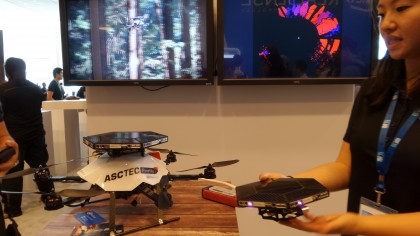Intel's 5G future can turn humans into IoT devices
Faster speeds and lower latency

What do cell phones, laptops, flying drones, robots and cars have in common? Intel's vision is that these devices can connect to an even faster next generation 5G wireless network by 2020.
The 5G network will provide a backbone for Intel's Internet of Things endeavors, a theme key to IDF 2015, and allow devices to connect at up to 100 times faster speeds than current 4G LTE technology today.

Another benefit of 5G networks is that there is very little latency or delays, which will enable real-time, instantaneous response, feedback and control of IoT devices. This opens the doors to remote robotic surgeries, self-driving cars and potentially even turning humans into droids.
No lag
With delays as low as just 1ms, Intel claims that 5G will be suited for tele-medicine. The network will also have minimal impact on battery life. For devices that don't need a constant connection, a battery can last up to 10 years on a single charge.
Paul McNamara, Vice President at Ericsson, said that 5G networks can be very adaptable to prioritize important commands for critical response.
For instance, for general safety, communications from a connected car can get prioritized in an event of a collision over a signal sent from a connected appliance. This way, the car can warn other nearby connected cars to brake while it is activating its airbags. This would be more critical than a connected appliance.
Wearables will also benefit from greater and broader 5G connectivity and coverage. Sandra Rivera, Vice President and General Manager, Network Platforms Group at Intel Corporation, predicts that one day your body can speak to your appliances, cars and other connected devices. Rivera envisions a day when people will begin implanting chips into their body.
Sign up to the TechRadar Pro newsletter to get all the top news, opinion, features and guidance your business needs to succeed!
The 5G future Intel wants can turn us into half-humans, half-Terminators.
This means that rather than wearing wearables, the sensors could someday live in or on your body instead, said Alex Choi, Chief Technology Officer at SK Telecom.
Want to find out more about 5G? Check out our dedicated 5G hub!
- Read about five things you should know about 5G